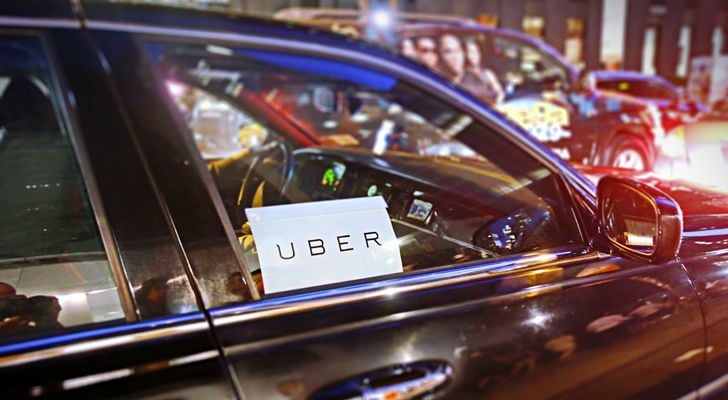It seems every investor wants a stake in the rideshare market. This week, we found out that Warren Buffett was no exception. The investment guru who runs Berkshire Hathaway Inc. (NYSE:BRK.A, NYSE:BRK.B) attempted to purchase a stake in rideshare company Uber Technologies Inc. The deal fell apart on terms. Though we may never find out the details of the agreement, investors have much to learn from this failure.
Uber Enjoys Similarities to Buffett’s Other Investments
To be sure, a deal would have combined some of Berkshire’s investment interests. Buffett has amassed billions investing in distressed companies under favorable terms, favorable at least for Berkshire. Buffett has also been a longtime investor in the auto industry. He holds stock in General Motors Company (NYSE:GM). He also owns Geico Insurance and Berkshire Hathaway dealership chain. Moreover, he now holds a large stake in Apple Inc. (NASDAQ:AAPL), despite avoiding tech companies for most of his career.
However, the proposed deal fell apart on terms. For now, those wanting to invest in Uber will have to settle for buying Softbank Group Corp (OTCMKTS:SFTBF) and enjoying an indirect stake in the rideshare firm. Softbank invested $1.25 billion initially and purchased an additional $6.5 billion worth of investor and employee-held stakes in the company.
Proposed Deal Similar to Buffett’s Goldman Investment
A successful stake by Buffett would have given Berkshire investors a stake in this company, albeit a very indirect one. Buffett proposed a similar deal to Goldman Sachs Group Inc (NYSE:GS
) at the height of the financial crisis.
Under the deal with Goldman, Berkshire invested $5 billion. The company made $1.6 billion on this aspect of the agreement alone. It earned further profits on warrants that allowed Berkshire Hathaway to purchase GS stock at a reduced price. Despite a high rate of cash burn, Uber CEO Dara Khosrowshahi was not prepared to agree to such a deal.
Still, both men expressed a deep respect for the other. Buffett called himself a “great admirer” of Khosrowshahi. For his part, the Uber CEO calls himself a “fan boy” of Buffett and considers attracting an investment stake from Buffett a personal goal.
Lessons Learned From the Failed Deal With Uber
Investors should remain keenly aware that mutual admiration did not drive a deal. This should be treated as a lesson that CEO admiration does not always lead to stock gains. For example, those who bought Tesla Inc (NASDAQ:TSLA) one year ago because they admire Elon Musk could be holding onto a loss of more than 25%. Also, many investors who bought Enron Corporation in 1999 because they respected Ken Lay found themselves wiped out.
Investors will more likely make profitable investments if they understand the other key to this deal: favorable terms. We know that Uber has never made money and will likely need injections of capital. These conditions usually lead to borrowers offering more favorable terms for their lenders.
Moreover, Buffett did not amass wealth by making unwise decisions. He was not doing the equivalent of buying an Amazon.com, Inc. (NASDAQ:AMZN) or a Netflix, Inc. (NASDAQ:NFLX) at triple-digit multiples. Due to the similarities to Buffett’s deal with Goldman, he was likely setting himself up to get into Uber at or below the IPO price, whenever Uber decides to go public. He probably would have also received preferred Uber stock that would have paid a high dividend.
Average investors cannot make such deals. However, most stock buyers can still hold out for low stock prices. They can also search for stocks that pay high dividends. Though investors need some background on financial statements to know how to define a “good deal,” holding out for favorable terms could lead to better decisions and ultimately, higher profits.
The Bottom Line
Investors should weigh the lessons of this failed deal and apply it to their own investing. Both Khosrowshahi and Buffett made it clear how much they admire one another. However, they did not allow personal sentiments to devolve into poor decisions. Both also wanted a deal only under favorable conditions. Since both parties could not agree on those conditions, no deal occurred.
Investors can learn two key lessons here. Admiration for an innovator or a leader should not drive investment decisions. Stock buyers should also look for buys that offer beneficial terms. Uber will not offer preferred dividends or discounted stock to average investors. However, ordinary investors can still look for metrics such as valuations, profit growth, and dividend yields to find a buy point that will more likely lead to profits.
Assuming an investor can learn to purchase stock under the right conditions, one can learn to invest like Buffett, even when one cannot make deals like Buffett.
As of this writing, Will Healy did not hold a position in any of the aforementioned stocks. You can follow Will on Twitter at @HealyWriting.

